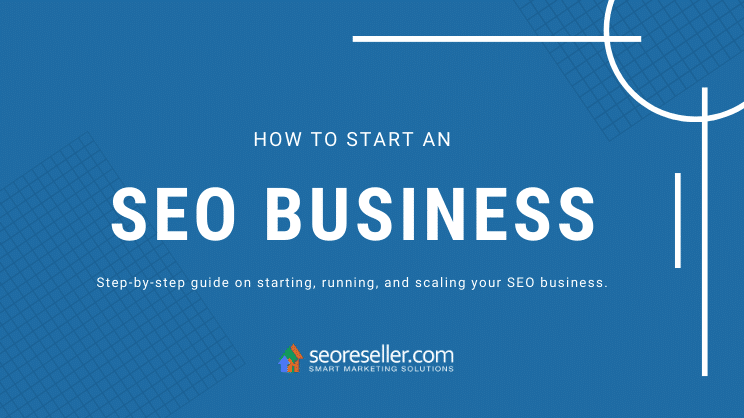It often starts with the idea of being your own boss. Then that idea breeds another one – achieving success.
No matter what brought you on the path of starting an SEO business, it boils down to these two questions: What is an SEO business and are you willing to give it your 100%?
The last thing you want to happen is to start an SEO business and end up with a half-baked venture and a string of unhappy clients. . . .
So what does an SEO company do? Simply put, SEO (acronym for Search Engine Optimization) is the process of making your website more visible in search engines. A company that specializes in digital marketing and SEO focuses on strategic processes to elevate your businesses online ranking. If a company is wanting to grow, compete with others in the same niche, needing more sales, and reach a wider audience, then SEO is a necessity.
We all know that Google is the king of search engines, but did you also realize how important it can be for your business? SEO expertly implemented will increase web pages rankings in order to make them pop up more when someone enters industry related “keywords” into their browser. From on and off page optimization, social media, content creation, pay per click ads, reputation management, speed, etc. . . these combined elements impact the grade of a page to influence ranking. A trustworthy SEO company can be the solution for increased visibility and better traffic numbers which leads directly towards more leads/sales as well!
Most people have started a growing business because they have utilized their skills to sell their product or service. SEO does not come naturally and most people have little to no experience with the topic and strategy. They hire SEO experts so they can focus on what they’re good at, and trust external companies to grow their business online. In this article, we briefly review how to start a successful SEO business so that your paying clients are ecstatic and satisfied with the results for their business.
That’s why we made this checklist – to provide you and other agency aspirants with step-by-step guide on starting, running, and scaling an SEO business.
Whether you’re an SEO consultant or a digital marketing professional aiming to have your own SEO agency, this checklist will instill the essentials to help you go from startup to powerhouse.
1. Everything You Need to Start an SEO Business 
The beginning is often the hardest, as they say. But, the sooner you understand the basics of how to start an SEO business, the smooth-sailing the next steps will be for your agency. The first thing you need to do is lay down the requirements for starting your SEO agency.
Are You Ready to Run Your Own Agency?
If you answered yes, there’s nothing that will stop you from continuing reading until the very end of this guide. But, if your answer is no, that’s okay. We’ll help you get there.
In reality, no one is ever ready to start and run an SEO company. Apart from the ever-changing SEO industry, you have operations to think about. Everything is a learning process.
Before you dive into making your SEO business plan, make sure you tick off the following:
Prepare to Quit Your Job
Let’s get one thing straight first – starting an agency isn’t an excuse to abandon work. If anything, you need to dedicate extra effort and time to get started on your SEO company.
But, when do you quit your job and focus your attention solely on your SEO business?
It’s when you have enough cash flow that matches what you’re currently making at your day job. It’s when you have enough loyal clients to maintain business continuity. It’s when people are asking about your SEO instead of you asking them to hire you.
If you think you’ve met the criteria above, then maybe it’s time to quit your job.
Possess Business Acumen
An SEO agency is like any other business. If you have zero business acumen, you’re likely to have a hard time keeping your agency above water.
Many business owners squander thousands of dollars just because they lack the sense of doing what’s best for their business. There are many resources online and amazing books you can read that can provide you with insights on setting up a successful SEO business. So, here’s your assignment—be sure to grab a copy of the following titles:
- The Seven Habits of Highly Effective People by Stephen Covey
- The $100 Startup by Chris Guillebeau
- Lost and Founder by Rand Fishkin
- The Lean Startup by Eric Ries
Learn the Basics of Digital Marketing
Neil Patel didn’t start out as an SEO guru. In fact, he had to learn SEO and experience a few hiccups along the way.
That’s the thing when you start an SEO business. . . people like Neil Patel didn’t establish their authority by sheer luck. It’s a matter of educating yourself about the industry.
Ask yourself this: Would you trust an agency that doesn’t have an ounce of SEO knowledge?
Not likely, right?
A wealth of information about SEO and digital marketing is out there, so you’ll have no excuse to skimp on the learning aspect. You can start with some of the downloadable materials we have on the Resource Center that you can access when you sign up. We also encourage you to check on Search Engine Journal, Search Engine Watch, Moz, and Google’s Webmasters Help Community for up-to-date information on everything digital.
Legal Matters to Handle
As with any business, starting a search engine engine optimization business comes with legal implications. Every decision is guided by specific regulations, and knowing these from the get-go can save you from headaches later on.
Determine Your Business Structure
Before you even come up with a name for your agency, you need to decide on your business structure. Your decision will depend on which provides the best structure when filing your taxes to the IRS. Do you want to operate as a sole proprietorship or as an LLC?
As a Single Proprietorship
Registering your SEO agency as a sole proprietorship means you’ll be running your business with a single owner. This is often the case for many startup agency owners who operate their businesses as freelancers. The flexibility and simple setup make this structure an attractive option for many SEO consultants aspiring to own their own agency, but it may come with a few risks.
As a single proprietorship, the agency may be liable for damages in case problems arise. Single proprietorship also doesn’t require filing business taxes separate from personal taxes. This makes it hard to determine the value of the business when it’s tied to personal assets.
As a Limited Liability Company (LLC)
As opposed to a single proprietorship, registering as an LLC means you can have more than one owner (member) to run the business. Operating as a Limited Liability Company (LLC) poses fewer risks for startup agencies—one of these is having business taxes separate from personal assets. Using this business structure for your agency also provides you with legal protection.
With limited liability, you can protect your personal assets from business debts and obligations. An LLC is also more favorable if you’re planning to reach out to suppliers or lenders.
NOTE: Talk to a lawyer or a CPA before deciding on the business structure for your SEO agency.
Create Your SEO Contracts
A contract may sound intimidating to clients, but trust us when we say you need one. It’s the only piece of document that binds your agency with your clients. However, an SEO contract goes beyond legalities. Think of it as an agreement on what needs to be done and what is to be expected from both parties.
An SEO contract allows you to go into the granular details of how your agency will handle campaigns – from the roles and processes to ownership of assets and the length of the agreement.
Set Up Your Payment Methods
Most agencies rely on the easy way to receive payment – PayPal. But, other payment methods are worth exploring if you want to make the most of every cent that goes to your business.
- Automated Clearing House (ACH) Transfers: Clients send an electronic money transfer from their bank account to a US-based business bank account. This can either be credit or debit transactions.
- Credit Card Payment: One of the most common payment methods practiced by businesses globally. Visa, Mastercard, and American Express are often the common card networks used. Many businesses prefer this method because clients only need to enter their credentials over a secure network to complete their transactions, we recommend Stripe.com.
- Online Payments: PayPal falls into this category. Other similar services are Alipay, Apple Pay, and Google Pay.
When deciding the payment method, think of what works best for your clients. Keep the experience smooth by ensuring each transaction is secure.
Prepare Your Invoice Templates
An invoice is proof of a transaction between a client and your search engine optimization business. This helps you organize and track accounts, so you know your agency gets paid within the payment terms. Each invoice should have its corresponding number for convenient tracking.
A standard SEO invoice includes the itemized charges with clear descriptions for each service rendered by your agency. The due date and payment methods should also be clearly stated in the invoice.
Your Agency’s Brand Matters
Your brand is one of the things you need to develop – not just at the start, but also as you grow your agency.
Building your agency’s brand is all about identifying what makes your clients choose you above other SEO companies. It’s what differentiates you from the rest.
Choose Your Search Engine Optimization Business Name and Logo
Your name and logo are the most recognizable aspect of your brand. Both go into all of your assets – website, business cards, online ads, lead magnets, and other digital resources.
When choosing your agency’s name and logo, think of the following:
- Value proposition: What are your main differentiators?
- Audience: Who is your clientele?
- Personality: What emotion do you want to evoke from your audience? How do you want them to perceive your brand?
Identify Your Target Buyer Personas
Your target buyer personas represent the ideal clients you want to attract and convert for your agency. Defining your buyer personas make it easier to understand your clients, their business, pain points, goals, and the digital marketing solutions they need.
Identifying buyer personas come in two parts: their demographics and psychographics.
The first part pertains to their physical characteristics, such as age, gender, location, and employment status. The second part refers to behaviors that influence their buying decision, such as motivations, goals, and brand affinities.
Buyer personas serve as a guide on how you’re going to position your SEO marketing business. These are highly useful when you’re crafting content that aims to nurture and convert prospects.
Choose Your Niche
This is where many startup agencies fall short.
It can be tempting to cast a wide net and take the “sell to everyone” approach when identifying the niche you want to service. However, knowing which niche to serve can make a big difference in how your agency scales. Do you want to offer SEO for small businesses or realtors? Are you into more competitive niches?
When choosing a niche for your SEO startup, consider the following:
- Go with an industry you’re familiar with. The more you’re well-versed with the industry lingo, the easier it will be to connect with prospects.
- Start with your social circles. Leverage the power of referrals.
- Do market research. This makes it easier to do prospecting and qualify leads later on.
Decide on Your Service Offerings
Are you focused solely on SEO? Do you want to expand to PPC, Social Media, or Web Design? Planning to cater to businesses in your area and offer local SEO for businesses?
Making SEO your main product offering provides your business with recurring monthly revenue. The reason behind this is SEO doesn’t stop in the first month. Clients need consistent optimization until they can see a positive ranking movement. Compared to web design that’s often packaged into one-off products, SEO as a service provides you with more flexibility to upsell clients.
Once you’ve already gotten your first few SEO clients and managed to get them to stay with your agency, it’s time to expand to other digital marketing services. For now, you should stick to one solution.
Build Your Website
A website can make the difference between getting prospects and losing them to the competition. At this point, it doesn’t matter if the website isn’t as stunning as most established digital marketing businesses (you can get to that later on). What matters is you have one.
For now, you’ll need:
- Domain and hosting: Choose a domain name that resonates with your agency’s brand and have it hosted on a web hosting site. GoDaddy, Bluename, and WPEngine are some of the domain and hosting sites we recommend.
- Platform: Start with WordPress. It’s reliable, easy to use, and, best of all, FREE. Plus, there are tons of WordPress themes for Search Engine Optimization businesses, so it’s easy to get started.
- Design: Not a designer? That’s fine. You’ll find tons of web design templates that take away the heavy lifting when it comes to design building. But, if you have the budget, you can outsource website design (or have our team build it for you).
Checklist: Things You Need to Accomplish
Have you done the following?
- Brush up on your business acumen
- Learn the basics of digital marketing
- Decide on your search engine optimization business structure
- Create an SEO contract template
- Set up a payment method
- Prepare an invoice template
- Choose an agency name and logo
- Identify your target buyer persona
- Choose your niche
- Decide on which SEO services to offer
- Acquire a domain and hosting for your website
2. Work on Your SEO Methodology
SEO companies are doing the same thing. Yes and no.
While on-page optimization, link building, and content marketing are the common strategies for ranking websites, each SEO agency has a different approach for its clients. All these depend on their SEO methodology – one that you need to define for your agency.
Let’s dive into how you can build the foundation for your search engine optimization business strategy and establish your expertise.
Develop Your Core SEO Methodology
It’s not about doing what Google says; it’s doing as Google ranks. Your SEO methodology is a culmination of expertise and strategies that ultimately provide value to businesses and their target customers.
In-house or Outsource?
Becoming an SEO consultant then transitioning into a full-time digital marketing agency means establishing your expertise. This doesn’t mean you have to master everything on your own.
There are two tracks to establishing expertise: build your in-house team of experts or outsource the work to experts.
Learn About Project Management
SEO is a never-ending project. Unlike web design that’s often a one-off project, you need to be continuously optimizing a client’s website to make it rank. This calls for learning project management so you can manage expectations, tasks, and – when you become a larger SEO business – manage your team.
Project management in SEO is usually two-pronged: Planning and Fulfillment.
Planning involves research, evaluation, and strategy. This builds the framework of your SEO campaigns, so you have a clear direction of what and when to do things. Keyword research, competitive analysis, website audit, and content quality evaluation often fall under the planning phase. After planning comes execution, and this is what fulfillment covers.
Fulfillment, however, goes beyond delivering what you promised to clients. It’s a matter of implementing a consistent, scalable process to get things done. Do you want to go about the SEO project in an agile way, or are you more of a kanban type of person? Fulfillment can go smoothly if you have a defined sequence—the result being an increase in the number of happy clients and more revenue for your SEO business.
As you learn about project management, it’s best to familiarize yourself with the following project management tools for SEO agencies:
- Zoho
- Asana
- Teamwork
- Plutio
- Basecamp
- Slack
Avoid using multiple platforms—choose one that fits into your current process and team setup. If you have a small team to manage your SEO business, it’s best to try the free project management tools and see how it goes.
Use SEO Tools
Every SEO starts out with the basic knowledge of Google Search Console or Google Analytics. Both SEO tools can provide reliable reporting metrics that come from Google search results.
But, are these tools enough? Not in the slightest. If you’re looking to establish a solid SEO methodology, you need an arsenal of SEO tools.
Many SEO tools and marketing tools for small businesses are designed to accomplish other tasks, such as keyword research, link building prospecting, and competitor analysis. You’ll find a combination of free and paid tools online—we recommend starting with the free ones, so you can get a feel of how the tool works first.
Be sure to check out the following tools:
- Google Search Console
- Google Analytics
- Google Data Studio
- Ahrefs
- SEMRush
- Moz
- ScreamingFrog
Pro-tip: Create a manual for SEO software and tools, then cascade to your team. This can become a part of your standard processes to eliminate dependency on individual talents.
Checklist: Things You Need to Accomplish
Before you move forward, be sure you’ve done the following:
- Develop your SEO methodology
- Determine whether to hire in-house experts or to outsource
- Learn project management skills
- Familiarize yourself with project management tools
- Determine which SEO tools to use
- Create a manual on using SEO tools and cascade to your team
3. Market Your SEO Agency
Marketing SEO services and your agency is about positioning yourself as the provider of choice for businesses looking to increase their digital presence. This means one thing—practice what you preach.
Think of it this way: will businesses trust your agency if they can’t even find you on Google? Highly unlikely.
An established online presence tells a lot about how your agency does SEO. Your newly-built website may take a few months to rank, but this doesn’t mean you need to rely on SEO alone. That’s what you’ll be learning in this chapter.
This section covers the best practices on marketing your SEO company and ramping up your online presence to ultimately get more SEO leads.
Inbound Practices
Inbound practices lay the foundation for your agency’s online presence. Think of it as passively getting eyes on your brand. This involves different strategies to attract leads to your agency – SEO, social media, content marketing, and paid ads.
SEO
SEO is the most cost-effective way of building your online presence, but only if you do it right. The key is to optimize your website as you do with clients.
On-page improvements
Do a quick SEO audit of your website and see what you need to improve. Do the pages target the interests of your buyer personas at their stage of the buyer’s journey? Is the website loading at optimal speed? Does the site navigation support user experience? Think of your agency’s website as needing its own SEO hygiene to rank better in search results.
Off-page initiatives
Link building strategies can go hand in hand with your on-page improvements. As your agency’s website is slowly getting organic traffic through on-page optimization, building links can provide you with referral traffic to boost authority to top pages.
Relevant Listings
Set up and claim your Google My Business listing to build your agency’s presence on local search results. You can also add your SEO business on Yelp and other relevant business listings to get more online real estate. However, make sure your Name, Address, and Phone Number (NAP) are consistent and accurate across these listing sites.
Reviews
Another boost to your SEO performance is having reviews on top review sites and on your actual website. Be proactive in asking your clients to review your SEO company, but do this without being too forceful. Each review should come from people you have a professional relationship with to attest to your agency’s reliability, work ethic, and integrity.
Social Media
If you don’t have a social media page, it’s time to create one. Businesses spend six hours on social media per week, with Facebook being the most popular platform they use to stay active. Using social media for your inbound efforts requires more than publishing posts on Facebook, though. You need to:
- Customize your message according to your audience and the platform.
- Be a member of social media groups to get insights on what your audience is talking about. Facebook, LinkedIn, and Reddit Groups are great places to learn about updates and topics that your audience is interested in.
- Be human. Don’t be a robot and post just for the sake of engagement. Instagram and Twitter are great platforms to show the human side of your agency.
Content Marketing
Content is (and will always be) king. But, it’s not simply about publishing a blog post and hoping prospects will stumble upon it. A solid content marketing strategy is all about presenting the right content to the right audience at the right time.
Optimize your website content around the intent of your buyer personas. Dive into Google Search Console and look at the queries your website is getting. Choose terms with high search volume and build topics for your content around these. Remember that your content should always be evolving. Update and optimize to align the content with the interests of your audience.
Paid Ads
Using paid ads is ideal for a highly targeted audience. Paid ads can supplement your SEO efforts, as this puts your agency in front of people who have the highest intent of working with an SEO company. You can go about this in two ways:
- Google Ads: This involves text, image, and video ads that appear on Google Display Network or Search Marketing Platforms.
- Remarketing Ads: Ideal for users who have already visited your site, remarketing ads help reinforce your value proposition to your audience.
With paid ads, you can stay on top of your prospects’ minds and be there when they’re ready to hire an SEO expert. Note: When doing inbound, always think of your buyer personas. Everything needs to relate to them at their stage in the buyer’s journey.
Outbound Practices
Outbound practices are strategies that you use to find prospects instead of them finding you. It’s your job to initiate contact with prospects and make your agency brand stick until they’re ready to get your complete SEO services. An effective outbound campaign involves a combination of strategies—this includes inbound practices.
Attend Trade Shows and Conferences
It may be the oldest rule in the book of marketing, but attending industry events can help your agency be more visible to businesses looking for SEO services. This provides you with the opportunity to connect with prospects.
Start with events that are happening within your area. If you know someone in the industry, ask them to introduce you to potential prospects—think of them as your handshake.
Leverage testimonials from a previous client. But, if you don’t have any testimonials to present, that’s fine, too. You can offer them something free and valuable (a lead magnet) in exchange for their contact details. A quick SEO audit is a good example.
Send Cold Emails
This ties with your inbound practices and trade show appearances. When a prospect provides their contact details (whether via a contact form on your site or a lead magnet you sent during your interaction at a trade show), you can pipe them into your email list. While there’s no definite formula to sending a cold email to a potential client, stick to the best practices to evoke the best response from prospects:
- Use a business domain on your email instead of a generic email address.
- Refine your email list—segment your list according to the message of your email.
- Include a compelling subject line and personalize your email message.
- Schedule follow-up emails to get a response—two follow emails can be a good start.
Both your inbound and outbound efforts should point to how your SEO agency can provide value to businesses.
Pro-tip: Use a lead generation tool to find prospects easier and faster for your audience.
Checklist: Things You Need to Accomplish
Here are the things you need to do before going to the next step of starting your SEO marketing business:
- Do a quick audit and optimize your website
- Start building quality links for your agency website
- Set up and claim your listings on relevant business listings websites (Google My Business, Yelp, etc.)
- Get reviews from your first client
- Optimize your social media profiles
- Join social media groups
- Write and optimize content for your buyer personas
- Launch paid ads campaigns to promote your SEO business
- Attend trade shows and conferences in your area
- Prepare a lead magnet to offer to prospects attending the same event as you
- Prepare and refine your email list for cold emailing
4. Sell SEO Services
Even if you’re an experienced SEO specialist, having the cadence to sell SEO services can make a big difference between a successful agency and one that’s barely making the cut. Everything boils down to defining your SEO sales process.E
Learn how to sell SEO to businesses and provide your agency with a repeatable process and tactics that lead to more revenue.
Establish Your SEO Pricing Structure
One of the things prospects will ask from you is how much your SEO costs. You’ll find different answers to this question, and it may get confusing if you’re not familiar with the value of SEO.
How do you justify the cost of your SEO to clients? Start by defining your SEO pricing structure.
SEO companies use three types of pricing structures for their services:
- Hourly: Agencies often apply this pricing structure for minor SEO tasks, such as keyword research and website audits.
- Fixed: This can be ideal for projects that include a combination of SEO work – from on-page optimization to SEO consulting services. Those who expand to other services consider a fixed pricing structure, such as when pricing their website design services.
- Retainer: Established agencies often put their clients on a monthly retainer pricing model that fits their budget and digital marketing needs.
As you start your SEO agency, it’s best to choose a fixed and hourly pricing structure before moving to retainer fees. Before you do that, research. Know the level of competition for the industry you’re planning to serve. Your pricing should also match the capability of your agency to deliver. Don’t shoot yourself in the foot by asking a steep price for your SEO services and overpromising—then make the mistake of under delivering.
Find Your Clients
You’ve done your research, figured out processes for SEO strategy, taken care of the legalities and more. The next step is figuring out how to get your first SEO client? Typically, the first clients are likely the following: referrals, prospects you’ve met at industry events, people within your personal and professional network, and people you’ve met on social networks (LinkedIn or Facebook groups).
Finding clients coincides with your inbound and outbound initiatives that we’ve discussed in the previous steps. The more visible your agency is, the more opportunities you have of connecting to businesses that need SEO services.
Here are a few things you can do to make it easier to find clients (or them to find you):
- Download the SEO Audit Widget. Every time a prospect enters their details on the audit widget form on your website, they get a free SEO audit. In turn, you get their email.
- Ask for referrals. A good word or two about your SEO company can spur prospects into getting your service.
- Cold call with conviction. Prepare a script, pick up the phone, and start calling businesses in your local directory.
- Offer free site audits. Give advice on how they can grow their organic search traffic. On any of your social media or websites, this can be a freebie in order to start communication with a potential client. Potential clients have a greater risk of turning into paying clients.
- Specialize in a specific niche, like legal services or real estate. This will help you identify what types of content should be created so that it fits right alongside other sites focused around these topics (and not vice versa). It solidifies your expertise and validates your position within the same industries. Helping one client
- Partner with design agencies if possible. This can produce compelling logos/icons while also creating marketing materials such as newsletters which could include promo codes listeners could use when booking appointments through various channels mentioned above.
- Speak at marketing conferences. Being on stage continues to build your credibility. Providing education for certain topics and niches in front of an audience will help grow your company name. References can also stem from these conferences.
- Publishing “pillar content” on the internet. Sharing it with friends via social media platforms such as Linkedin or Pinterest.
- Creating monthly packages targeted toward specific needs.
- Reaching out to individual businesses through email campaigns.
While not all of them will always work, these have been known to help accelerate the process of finding retainer clients.
Note: Take the time to get to know your clients before you reach out. This will help you match your sales approach to the type of client you’re facing.
Qualify Your Leads
A common mistake startup SEO agencies – even some of the established ones – make is selling SEO to everyone.
Why? Two reasons: 1) It’s a waste of time; 2) Not all prospects are right for your SEO company.
This is where qualifying leads come in.
Qualifying your leads allows you to focus on the right prospects based on four factors: Budget, Need, Authority, and Timeframe (BANT).
These factors entail whether your prospect can afford your services, has a definite need for your expertise, has the power to make decisions, and is ready to buy from you.
Develop a Set of Probing Questions
Probing questions allow you to determine the needs of your prospects and whether they’re right for your agency. Some of the questions to ask SEO clients are:
- Did you work with an SEO company before?
- How satisfied are you with your current SEO agency?
- What are your main challenges? How did you resolve these?
- Do you have a marketing budget?
- How do you measure SEO success?
Pro-tip: Use this client questionnaire template as a guide when developing your questions.
Know When to Say No
As much as you want to take on all prospects and their requests, you have to face the reality that you can’t do everything—even more so if you’re running a small SEO business. This is where you draw the line.
Set high standards at the beginning and stick to them. It may seem a bit absurd to say no to SEO clients (because why would you turn away business, right?), but this allows you to prioritize leads who are more likely to convert.
The entire qualifying phase revolves around this. If you deem a prospect not fit or may not need your services now, you can put them into a nurturing campaign until they’re ready to become your clients.
Pitch to Your SEO Prospects
A strong pitch is a combination of a great amount of prep, an SEO proposal that sells itself, and a good rapport with your prospect.
Do Your Prep
Think of this as doing your homework—or what we call Step 0.
Your prep allows you to develop a pitch around your client, not around your SEO agency.
What are their business and industry? What are their common pain points? What solutions do they need?
Everything you need to learn about the client to help them find the right solution and position yourself as the agency of their choice happens in prep.
Create a Proposal That Sells Itself
Your SEO business proposal is your agency’s value proposition in print. It includes information about your client, the details of your SEO methodology, your proposed SEO solution, and the timeline and deliverables.
It’s best to have a template for your SEO business proposal, so you can simply plug in the information. This saves you time on building an SEO proposal from scratch.
Supplement your SEO proposal with marketing materials to reinforce the value of your SEO service. Send them a pitch deck, a comprehensive competitor analysis, case studies, or even white papers. This helps in demonstrating the impact of your SEO service on their business.
Build Rapport
A strong rapport with prospects allows you to have a stronger influence on their buying decision. Not only does this show effort in building a good relationship, but it also helps you establish trust. As you get the hang of running your startup SEO agency, you should also dedicate time to learning a few rapport-building techniques:
- Common ground
- Cheerleading
- Humor
- Mirroring
- Me-Talk
Close Your SEO Prospects
You’ve pitched and talked to clients. Now, it’s time to close.
There’s one rule we always reinforce when it comes to closing: Once you’ve said your closing pitch, STOP TALKING. The first one to speak loses.
That said, make sure that you’re closing line is strong because this sets the tone on whether a client will accept or reject you. Learning sales closing techniques can help you determine what’s the best to say as you end your pitch:
- Sell the benefit of your service.
- Close by scheduling your next conversation (assumptive close).
- End with a question that offers them a limited choice (assertive close).
IMPORTANT: In any pitch, there will be objections on price, the value of the service, or even SEO horror stories. Learn how to overcome these objections so you can solidify your pitch.
Retain Your Clients
Closing a prospect doesn’t mean you stop trying to win their business. You need to provide value and build desire consistently and continuously to make them stay with your SEO agency.
The moment you stop building their desire to work with you is the moment you lose clients. This can affect your SEO business because of lost credibility and relationships. Client retention lays the groundwork for your startup agency to scale. It drives repeat business and predictable revenue, so you can eventually attain a seven-digit earning SEO agency.
Checklist: Things You Need to Accomplish
Before moving to the final steps, make sure you’ve ticked off the following:
- Establish your SEO pricing structure
- Download the SEO audit widget
- Ask for referrals
- Cold call
- Qualify your leads
- Develop a set of probing questions
- Say no to clients who are not the right fit for your agency
- Do your prep before pitching
- Create an SEO proposal and other marketing materials for your pitch
- Learn rapport building techniques
- Learn closing techniques
- Write down the different ways to keep clients
5. Maintain Business Continuity and Operations
One of the challenges of most SEO startup agencies is not having the cadence to run their operations. The lack of predictable processes, in turn, affects their bottom line. This doesn’t have to happen to you.
By following the practices we’ve outlined, your newly established SEO agency can have the process to maintain business continuity and run operations smoothly.
Align Sales with Fulfillment
While it’s tempting to get as many clients on board with your agency, it’s important to think of your operational capabilities. Remember that you’re operating as a startup—that means your resources and manpower are limited to what’s available to you. This calls for alignment between sales and operations.
Your SEO business plan should include the following steps:
- Evaluate if sales goals are aligned with your operations.
- Set a baseline and performance measurements across intersecting areas.
- Identify the gaps to develop a more collaborative approach.
- Map out a process with clear timelines and deliverables.
Keeping your sales aligned with fulfillment will help you deliver what clients need and ensure consistent performance.
Avoid the Talent Trap
Most SEO companies that are new often have a limited number of heads in their team—a team of two or five at most. Given the lack of hands to take care of the work, there are often cases of work falling into the responsibilities of a select few in the team. That’s a talent trap in the making.
You need to acknowledge that every talent in your team has limitations. What happens if the talent handling the very campaigns you have suddenly gets sick or leaves? Who will take care of the work? Instead of relying on a single rockstar to bring you success, develop a succession plan. This should include standards for experience, products, and customer expectations.
Build Processes
This ties with avoiding the talent trap. Your agency should be process-driven.
Developing processes helps you avoid being too dependent on talent and provides you with defined steps that your team can follow on autopilot.
Think of the Pareto principle – focus on doing 20% of the effort that drives 80% of results for your clients and agency. This makes it easier to prioritize tasks and your whirlwinds (tasks that take too much time to accomplish but have minimal impact, such as admin work).
Develop processes and provide documentation, such as:
- Checklists for repetitive tasks
- Operations manual
- Sales manual
- Customer service manual
Pro-tip: Create these processes and support with training to establish a cadence of responsibility for your team.
Prepare to Scale
At the end of the day, every startup SEO agency wants to reach that high revenue mark.
This points to the question, “How do you scale your SEO agency?”
One simple answer—don’t be the hero.
What we mean by this is to delegate tasks to people in your team. Most agency owners (especially those who are new owners) tend to roll up their sleeves and take on the work themselves. As honorable as that may seem, it’s counterproductive. To scale your agency, you need to work ON it, not in it.
Outsource the Work
If you or anyone on your team can’t do the work, outsource it. We’ve covered outsourcing a bit in the previous section, but we’re going to dive deeper into how this can affect your operations.
Outsourcing your SEO provides you with more time to focus on your agency’s growth instead of the minute tasks. Moreover, it helps you tap into a larger pool of talent to get deliverables done while establishing your expertise. You can outsource SEO to freelancers. This may be the ideal option if you have small SEO projects or tasks that require a minimum number of hours to accomplish.
However, if you’re looking for a long-term partnership to deliver bulk SEO work, outsource to an SEO provider. This provides you with a larger team that will take care of your projects.
Pro-tip: Look for case studies provided by the outsource professional that showcases their ability to deliver results consistently.
Checklist: Things You Need to Accomplish
Just a bit more and you’re all set! Be sure to accomplish these for your SEO business:
- Set a baseline and performance measurements to align sales and fulfillment
- Create a succession plan to avoid the talent trap
- Develop processes and provide documentation for internal use
- Delegate tasks – don’t be the hero
- Find an outsource provider to ease fulfillment from your in-house team
6. Conclusion
Starting an SEO company will test your capabilities and will.
Many would-be SEO company owners tend to give up halfway—don’t let that be you.
If you manage to do all the things in this checklist, that’s already a big win. But if you need another set of hands to establish your SEO agency, we’re here for you.
While the steps to starting your SEO business may feel like an uphill battle, the result of all the work can be worth the effort. All the learnings that come with the changing digital landscape, as well as the businesses you can help along the way, make your work as an SEO agency more than fulfilling!










Great article Itamar.
I want to ask you.
What is the most difficult part about starting an seo agency?
Kind regards,
Filip
As a full-service advertising agency, I understand that it is imperative to take the time to brand and advertise yourself, in order to instill trust in any potential clients. If they look at your online presence and it is anything less than impressive, they likely won’t want you to perform that same work for their business. SEO is such an in-depth process that is not a one-and-done kind of service; it takes a lot of work month after month, so it’s definitely important to form positive relationships with your clients. Great article with action steps on how to turn the SEO agency dream into a very possible reality.